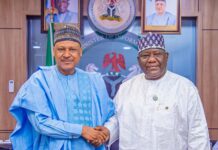The Chairman of the Independent Corrupt Practices and Other Related Offences Commission (ICPC), Professor Bolaji Owasanoye (SAN) has stated that lack of integrity by professional bodies was responsible for the spate of corruption in Nigeria.
Professor Owasanoye, who was the Special Guest of Honour at the 11th Summit of Professionals organised by the Association of Professional Bodies of Nigeria (APBN), noted that the country’s ailing economy was currently suffering from maladies bordering on lack of integrity and good ethical conducts.
He said, “If we must achieve our dream of sustainable economic growth as a nation, integrity should be the cornerstone of every professional practice, and professional bodies must be seen to enforce their code of ethics to the letter.”
He noted that hardly can financial fraud be committed without the complicity of a ‘professional’, hence the decision of ICPC to introduce a Forum of Professional Bodies and Business Management Associations, which brings professionals together to brainstorm on how to reduce corruption to the barest minimum and to conduct their businesses with uttermost integrity and strict adherence to code of professional ethics.
According to him, “The overall objective of the Forum is to sensitize professionals on the content of anti-corruption laws, especially the Corrupt Practices and Other Related Offences Act, 2000 and discuss the possibility of infusing relevant aspects of the law into the professional code of ethics of various professions so that violating the codes of ethics would invariably amount to violating ICPC Act and therefore punishable”.
The ICPC Chairman added that the Commission has made further efforts to help reduce corruption in the country by liaising with various professional bodies through the forum.
“Between 2013 when the Forum was introduced and 2018, ICPC had conducted five sessions whereby it sensitized and interacted with 627 professionals from 28 professional bodies. ICPC had signed Memorandum of Understanding with some professional bodies such as the Council for the Regulation of Engineering in Nigeria (COREN) with the view to ridding the engineering profession of unwholesome behaviours such as quackery.”
He reiterated that the private sector, consisting largely of professionals, was important to the implementation of the National Ethics and Integrity Policy (NEIP) just as he urge the association to team up with ICPC in the implementation of the Policy.
In his remark, the President of APBN, Surveyor Akinloye Olufemi, noted that the Association, being the umbrella body for all professions in the country, has the undisputable responsibility to continue to intensify its effort on advocacy against corruption.
The ceremony was attended by key stakeholders from thirty (30) different professional bodies that make up the APBN.



















